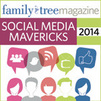|
Susan Clark is the author of the blog Nolichucky Roots. I first met Susan at the FGS Conference in Springfield, Illinois last year, and I have enjoyed following her blog for a while now. I love when Susan participates in the 48 Hour Ephemera Challenge because I know we are going to get sound analysis of the problem and excellent suggestions for whomever we are searching. Her contribution to the Tech Researchers Use to Get the Job Done Guest Post Series discusses wildcard searching, and how invaluable it has become in researching her Eastern European roots. Enjoy! ~Caroline Searching Outside the Box  *Photo Credit: Some rights reserved by Jeffrey Beall *Photo Credit: Some rights reserved by Jeffrey Beall When Caroline asked me to write a guest post on the tech tools I use in my family history research several ideas ran through my mind. This is not unusual. Lots of things run through my mind, but most get away before being caught. My research efforts the last few years have been internet based. I'm beginning to get back out on the road starting to use cameras, GPS, portable scanners and mobile devices. I love them. But what has been most valuable to me with internet research has been thinking outside the box when it comes to search terms. Get Wild I've needed to get very creative in order to catch sight of my elusive relatives and capture their online information. Half my tree is made up of lovely 20th century immigrants with lovelier Eastern European names. Names they, as well as many census enumerators and immigration officials, had trouble spelling consistently in English. Wildcards, those wonderful symbols that replace one or more letters in a name, have been my salvation. The asterisk will replace up to 5 letters on Ancestry's search engines. A question mark will replace a single letter. I looked repeatedly for my great-aunt Susanna Pereksta's immigration records. I found nothing until Ancestry.com and Steve Morse's superb One Step pages added the Hamburg Passenger Lists, 1850-1934 database. Using “Sus* Per*a” as a search term I found her indexed as Susie Perexta leaving Hamburg on Feb. 1, 1911. Those German indexers were pretty good spelling the Eastern European names. Not so for the American indexers. With a date I was able to search the other databases for an arrival record. When I searched for women with a surname of “Per*a” arriving in February, 1911 I found her. She was indexed as “Luria Peresla” in Ancestry.com's Philadelphia Passenger Lists, 1800-1945 database. I love wildcards. Note that I had to drop her first name to find the record. Wildcards work differently with Google and other internet search engines. The easiest way to find out what wildcards work with the engines you use is to search! A search of “wildcard search” and the name of the engine I want to use gives me a quick rundown of the options. Google, for instance, does not support the asterisk and question mark symbols in the same way as Ancestry.com. But you can use an asterisk to replace entire words in a phrase or put a search term in quotation marks to search for an exact phrase. Before Google Books revised its format and restricted searches of many books, I was able to confirm that a Margaret Meredith living in Baltimore in the early 1800s was the widow of one of my husband's distant great-uncles by searching for her with a business name “ “Thomas Meredith * Co.” Margaret Baltimore.” I used the asterisk to allow for and or &. The search led me to a case cited in Monongalia County (West) Virginia, Records of the District, Superior, and County Courts: 1813-1817 by Melba Zinn (Heritage Books, 2009) where Margaret Meredith was named as a partner in the firm after the great-uncle's death. Get Narrow Another successful search strategy I've used has been to look for names or phrases that are more unique to narrow a search field. I found one of my Pereksta relatives in the 1930 census by searching for their youngest child at the time, their 2 year old daughter Olga. She turned up indexed as Olga Pereskata. Her father was indexed as John Pereskith and had eluded my previous searches. My husband's ancestor Joseph Jones proved much easier to find when I searched using his daughters' names – Cansada, Brazilla and Talitha. Their names were rarely spelled the same way twice, so I again relied on wildcards. But I got far more targeted results than typing great-grandpa Joe's name. I'm currently obsessed with searching Old Fulton NY Postcards after one of Caroline's 48 Hour Ephemera Challenges sent me there hunting for information about a dude with a long beard. “Dude with a long beard” didn't get me much, but I realized the collection of early 20th century New York newspapers might have information about my immigrant relatives. This website (as do many others) uses OCR (Optical Character Recognition) software to search digital images of the newspapers which can get a little funky. I searched for a family named Tanch and got hundreds of real estate listings for small ranches. Not especially useful. My Sidor/Sedor/Szidor/Citar cousins can be a challenge since they took several generations to settle on a spelling. Narrowing the searches to a specific city and date range helped, but it wasn't until I added the name of their church that I got useful results – and those results were a goldmine of information about the immigrant community. I stopped using surnames altogether and settled on searching for “St. Michael's” in Binghamton and for a given year. I found wedding announcements, death notices, youth group and fraternal organization activities. I got a sense of the church community that defined my grandparents lives in the United States. I've used the same strategy to narrow newspaper searches for my Smith in-laws. Even in a small town there are lots and lots of Smiths. Lots. Adding "Dr." or "Catholic" or a street name to the searches has yielded far more useful results. So get wild, but also get narrow when searching for your kinfolk. Add the name of your father's high school, your grandmother's business, the name of your cousin's college band or prize steer to your search terms. You may be amazed at what you find. Susan Clark *Photo Credit: Some rights reserved by Jeffrey Beall
11 Comments
4/15/2012 09:19:17 pm
Get wild...love it! What I really love about this is its use goes beyond genealogical research. These are tools anyone can use when doing ANY kind of research. Thanks so much for inviting Susan to write a guest post, Caroline; can't wait for the next one!
Reply
Caroline Pointer
4/16/2012 07:11:45 am
Laura, you're right. It does go beyond genealogical research. I think Susan did a great job!
Reply
4/15/2012 10:01:31 pm
Thank you, Susan. I think I stumbled on this in the nick of time. I can't find my great grandmother before her first marriage in England in the late 1800's. She must have come from Poland or similar country. She kept changing her name! Maybe these tools will help?
Reply
Caroline Pointer
4/16/2012 07:14:35 am
Betsy, can't speak the praises of wildcard searching enough. Helped my find the small [and I mean, small] village in Poland [once Prussia] where my great-grandfather was born.
Reply
4/16/2012 03:25:30 am
'Get Wild' - one of the best pieces of advice going. The asterisk is SO useful.
Reply
Caroline Pointer
4/16/2012 07:16:37 am
Andrew, Amen to the asterisk!
Reply
4/16/2012 09:42:37 am
Susan, your comments are sure to be useful to me. I also have relatives who could not settle on the spelling of their surname, and who are sometimes listed with an asterisk, or two asterisks, on ancestry.com. I hadn't thought of using the asterisk in a search, though. Excellent. I have some elusive relatives with strange first names they spell several ways, like Kirley/Curley. Your advice is excellent: get wild, get narrow. Now I'll go back to the 1930 census. Thank you!
Reply
4/17/2012 11:09:57 am
Strange first names can be enormously helpful, though consistent spelling would be nice, wouldn't it? "*ley" may do the trick, though.
Reply
4/16/2012 01:49:07 pm
Thanks for the tip about narrowing the search field, Susan! So often I try expanding the field for greater results, only to become frustrated. Next time I'll take the opposite approach, hopefully with better results.
Reply
4/17/2012 11:15:33 am
I was thrilled with the results using narrow search terms, Shelley. Hope you strike gold, too!
Reply
Leave a Reply. |
Categories
All
Archives
February 2017
|
|
© Copyright For Your Family Story 2016 - All Rights Reserved
|

